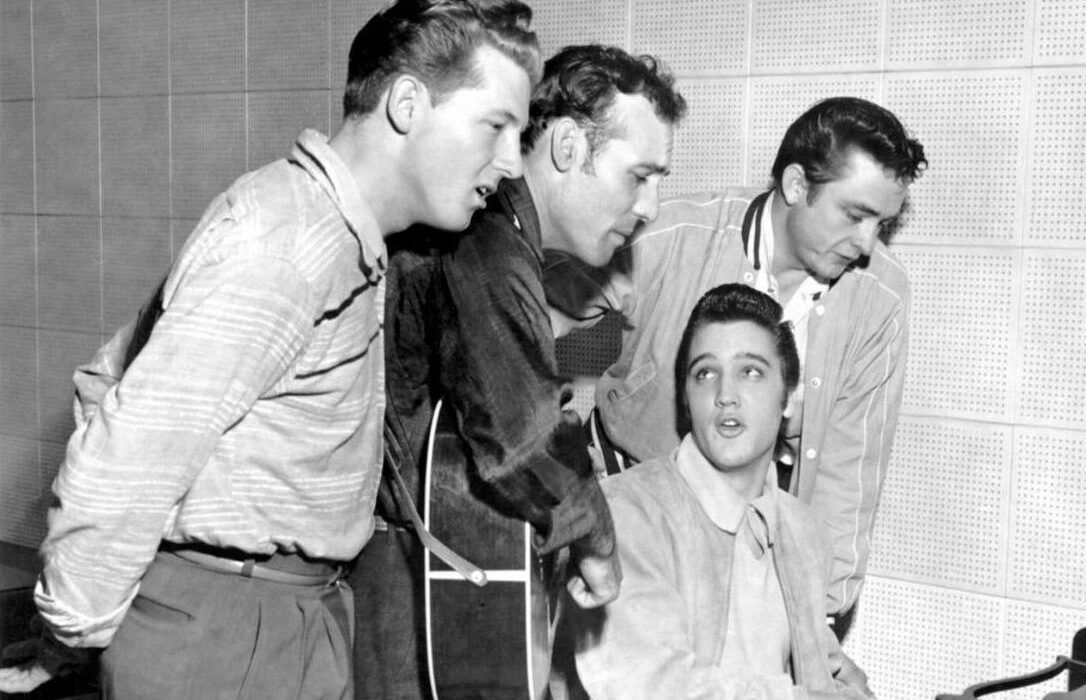Million Dollar Quartet, the show inspired by a legendary Sun Records jam session in 1956, was an unlikely hit when it made its Broadway debut in 2010. Although it was based on an actual event, the musical takes liberties with what actually went on during that memorable day in order to create a more appealing show. If you take that into account, you can ignore the show’s numerous exaggerations, anachronisms, and falsehoods, because it is simply enormously entertaining. The show opens this Friday for a two-weekend run at the Fred Kavli Theatre in Thousand Oaks.
The incident the show is based on took place on December 4, 1956 when Carl Perkins arrived in the Sun Studios in Memphis with his band to work out some new material. He meets newly signed Sun artist Jerry Lee Lewis, who had just cut his first sides for studio owner Sam Phillips but now was brought in as an accompanist to back Perkins on piano. After a while, the group is joined by Elvis Presley, paying a visit to his old friends, who wanders in with his current girlfriend, Marilyn Evans. By this time, Presley was a star, having moved over from Sun to RCA Victor the previous year and who already had recorded seminal hits like “Heartbreak Hotel,” “Hound Dog,” and “Don’t Be Cruel.” The trio of friends gather around the studio piano, singing and joking through a litany of mostly old gospel numbers, when Sam Phillips, recognizing a potential history-making opportunity, calls Johnny Cash to join them, along with a reporter and photographer from the Memphis Press-Scimitar. As Phillips rolled tape, the quartet spent the late afternoon singing their favorite gospel, country, pop, and R&B songs, the building blocks of rock ’n’ roll. They would never appear in the same room again.
Escott, a music historian who had been researching the history of Sun Records since the 1970s, and director Mutrux, created the stage version of the event. The two understood that in order for the show to be accessible to the general public, it had to play fast and loose with the facts. Although Cash left early and could not be heard on the original tapes, he insisted in his memoirs that he was present, so Cash was given an equal presence to the others in the musical. The songs performed that day consisted of country gospel numbers, a few Bill Monroe covers, and snippets of “Home, Sweet Home,” “When the Saints Go Marching In,” and other pop songs thrown in. The musical’s revamped playlist substituted mid-fifties hits like “16 Tons,” (in a clever juxtaposition with Little Walter’s “My Babe”) and the anachronistic addition of Cash’s “Ring of Fire,” which wouldn’t be recorded until 1963. Only “Down By the Riverside” and “Peace in the Valley” remained from the original playlist of sacred songs.
There are other things that didn’t happen, such as Perkins and the volatile Lewis almost getting into a fight, two vocals by Elvis’s girlfriend (played by Kelly Lamont), now named Dyanne, a tagalong showgirl, and, in the only really dramatic scene in the show, Cash & Perkins telling a betrayed Phillips they were leaving Sun to record for Columbia (Cash wouldn’t opt out until the next fall; Perkins until 1958). Lewis’s rant about “the devil’s music” actually happened, but at a later session, which Phillips also captured on tape. Despite these variances from the truth, there is still enough authenticity in the show to make the between-songs drama effective.

Playing the role of Elvis is 27-year-old L.J. Benet, who was born decades after the untimely passing of Presley in 1977. His knowledge of Presley was limited to seeing an Elvis impersonator at a Massachusetts theme park when he was eight years old and being asked to sing “Can’t Help Falling In Love” at his aunt’s wedding. “She wanted me to sing it like Elvis did,” Benet said in a recent interview, “so I practiced how he did it and I’ve had this low twang ever since. Since our first rehearsal, I’ve learned a lot about him, especially about where he was at in this time period. I can identify with him trying to figure out who he was and it isn’t far from what people who grow up in this industry have to go through.”
“My favorite bands while growing up in high school were the Killers and The 1975 but I also listened to a lot of Elton John and Aerosmith. But I’ve learned how Elvis became the foundation for any rock star who came after him.”
Elvis’ girlfriend Dyanne, played by Summer Greer, is a new character with a new back story, which enables Greer to be freer in her interpretation. “She is a kind of a free agent,” Greer said. “She’s traveling with him from Hollywood, and has this incredible voice of her own. But I get the impression she’s not necessarily new to this. She’s a little green when it comes to the recording industry but she is able to hold her own, and that’s something I like to dive deeper into.”

Greer also sings jazz in addition to acting, and was familiar with songs like “Fever,” made popular by Peggy Lee, one of her favorite performers. The casting of Greer, an African American, can be considered indicative of not only Elvis’ colorblind character, but to represent the scope of songs the four singers were known to have favored, a mix of white and black musical traditions that helped usher in rock ‘n’ roll in the 1950s. Greer agreed. “Here’s this girl who is coming with him from Hollywood and who has this spectacular voice and he just wants to bring her home with him. Outside the studio in Memphis at the time, this might have been a different situation but that’s the thing about music is that it’s a freeing art that connects and brings people together.”
Million Dollar Quartet plays at the Bank of America Performing Arts Center March 15-24. For tickets, visit www.5startheatricals.com






No Comments